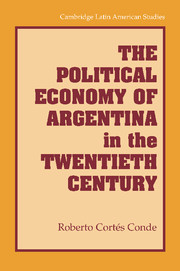Book contents
- Frontmatter
- Contents
- Acronyms
- Acknowledgments
- Introduction
- 1 Period of Rapid Economic Expansion: 1880–1914
- 2 From World War I to the Great Depression of 1930
- 3 From the 1930 Financial Crisis to World War II
- 4 The Political Economy of Peronism
- 5 A Divided Society, 1955–1973
- 6 The Long Decline
- Epilogue
- Statistical Appendix
- Bibliography
- Index
- Titles in the series
- References
2 - From World War I to the Great Depression of 1930
Published online by Cambridge University Press: 28 August 2009
- Frontmatter
- Contents
- Acronyms
- Acknowledgments
- Introduction
- 1 Period of Rapid Economic Expansion: 1880–1914
- 2 From World War I to the Great Depression of 1930
- 3 From the 1930 Financial Crisis to World War II
- 4 The Political Economy of Peronism
- 5 A Divided Society, 1955–1973
- 6 The Long Decline
- Epilogue
- Statistical Appendix
- Bibliography
- Index
- Titles in the series
- References
Summary
The Great War
The years between World War I and the 1930 crisis may be characterized as a period of great transitions. As a response to the extraordinary economic challenges that arose during the crisis, institutions would be forever altered, with policies that would be further elaborated during World War II. The Great War represented a watershed between the world that was open to trade, and to the movements of capital and people, and the world of the closed economies that followed. Yet it was the 1930 crisis that definitively ended la Belle Epoque and the “Roaring Twenties” and led to the creation of this different world.
World War I had also left considerable intellectual changes in its wake. The notion of total war led to government intervention in economic affairs. But this intervention was also spurred on by workers and entrepreneurs who demanded it, as they began to realize that they could improve or imperil their respective positions (their relative prices) by doing so. To that point in time, prices had been negotiated on the market.
When the government financed projects by issuing debt or currency, the move had an effect on workers' real earnings and savings, as well as on capital and financial markets. Government intervention in trade and financial and exchange markets, in housing rents, and so on, created a new framework; the government made decisions that had previously been dealt with between the interested parties.
- Type
- Chapter
- Information
- Publisher: Cambridge University PressPrint publication year: 2008



